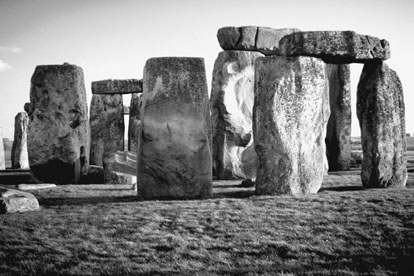

 | Page 203 |  |
capacity to assist in the writing of prehistory. Much antiquarian scholarship was based on close analysis of the works of the classical authors, which were considered to have much the same status as eyewitness testimony. But there was also an increasing element of material analysis—involving coins, inscriptions, and other artifacts that had been accumulated by antiquaries in “cabinets of curiosities.” These collections, which were sometimes vast (as in the case of Sir Robert Bruce Cotton), were a significant resource for the antiquaries; they also formed the core of the collections in many museums, such as the Ashmolean and the British Museum.

The ancient stone monument Stonehenge in England
(Corel)
The rigorous analysis of material culture was a vital source of direct information about the prehistoric past, but this was equally true of field studies on monuments (through recording rather than excavation). Notable early exponents of such work were John Aubrey, william dugdale, edward lhwyd, and Robert Plot, who amassed records of hundreds of sites of “pre-Roman” age during the seventeenth century. This tradition was ably carried on in the eighteenth century, most prominently by Stukeley, whose long career in the field was crowned by his careful excavations at Stonehenge. The realignment of British antiquarian interest from a concentration on the analysis of literary sources, coins, and field surveys to the inclusion of site excavations (particularly mounds and barrows) is the most significant innovation of the eighteenth century (along with the foundation of the Society of Antiquaries of London in 1718). Something of an excavation mania gripped British antiquarian circles from the mid-eighteenth century until well into the nineteenth. Most notable among the early excavators was the Reverend Bryan Fausett (1720–1776), who focused on Saxon tumuli and is reported to have excavated over 750 of them. There can be little doubt that Fausett’s enthusiasm was not matched by his skill, and the damage done through his uncontrolled excavation was incalculable. Nonetheless, he was an ardent collector and an untiring propagandist for British antiquity. Fausett’s passion was shared rather more
 |  |